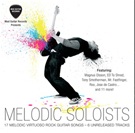How To Write Lyrics About Almost Anything
 I have a friend who is a really talented composer and multi-instrumentalist. He’s always showing me his latest tune or composition, and they’re pretty damn great. He’s desperate to succeed in music, but in the two or three years I’ve known him, he’s made no progress at all in getting his first album together. I asked him why, and his reply was something like “I can’t come up with a theme for the lyrics. It seems everything has been done and I can’t come up with anything original.”
I have a friend who is a really talented composer and multi-instrumentalist. He’s always showing me his latest tune or composition, and they’re pretty damn great. He’s desperate to succeed in music, but in the two or three years I’ve known him, he’s made no progress at all in getting his first album together. I asked him why, and his reply was something like “I can’t come up with a theme for the lyrics. It seems everything has been done and I can’t come up with anything original.”
He’s not alone. As I discussed in my last article, lyric-writing is a major blockage in the creative process of a great many musicians and is holding them back from their potential. In this article, I’m going to outline a process that will let you get decent lyrics out of just about any subject, no matter how unpromising it may be.
Stage 1 – Pick a Subject.
This is easier than it looks. There’s no need to come up with something profound or world-shaking at this stage of the process. This is where a lot of aspiring poets and songwriters go wrong, they work from big things, big themes, and then try to compress them down into a couple of dozen lines of words. That’s really really hard to do. Far better is to come up with something small and bring the ideas out of it. Just pick anything that is in any way interesting, or that happened to you recently.
The other week I went to a barbecue. Let’s write a song about that.
Stage 2 – Find the emotionally significant aspects
What is it about your chosen subject matter that has an emotional impact? For a barbecue, I guess you could talk about the togetherness of being with your friends or the pleasure from good food, but if you do, you went to a better barbecue than I did. The host was not the greatest cook, and managed to burn everything to a cinder. We had to feed most of it to the dog and do more food in the oven instead.
So what are the key emotional triggers about that little story?
Dashed Hopes – that the food didn’t turn out the way we wanted Disappointment – Barbecues are usually way better than that Sacrifice/Waste – Those sausages weren’t cheap, and we ended up feeding them to the dog. Humiliation – For a man in his garden, failure to successfully BBQ is on a par with admitting you like figure-skating in terms of machismo.
Those are some good themes that have produced some great songs over the years, let’s run with those.
Stage 3 – Write the music.
Now you have your emotional themes, you can get to work on the music. Disappointment, waste, humiliation, all give strong pointers to the kind of song this is going to be (hint: it’s not a bouncy ska number).
Stage 4 – Detach those lyrics!
I discussed detachment in my last article. Basically it involves stripping the original subject matter out of the song and leaving the images and emotions it creates. This is key to writing good songs about mundane things, because it hides the origins of the song whilst maximizing the things that make lyrics work well – imagery, imagination and emotional impact.
So, with the emotional themes we’ve established, what are the images from the disastrous barbecue that we can work into the song? There’s some good ones here:
- Things starting out frozen
- Burning flesh
- Flames
- Ashes
- Hunger
- Wasted effort and money
- An animal consuming charred meat
All good things that can be worked into the lyrics without giving the game away. So, ladies and gentlemen, I present to you a song about a terrible barbecue that sounds like, totally profound you guys (It helps if you imagine this song sung by Eddie Vedder or Aaron Lewis with a painfully earnest expression).
“To Ashes”
Scraping back the layers of frost The things we hoped, the things we lost Things we bought at such a cost To Ashes, To Ashes.
We know that things can’t stay the same Reduced to nothing in the flame Must we always play this game? To Ashes, To Ashes.
Looking back on what we had The dreams we had that turned so sad I know your hunger burns so bad To Ashes, To Ashes.
In the flames we found our flaw Everything that we fought for Sacrificed to the beastly maw To Ashes, To Ashes.
Everyone I’ve played that song to has assumed it’s about a failing relationship and is full of deep and profound themes. I don’t deny it. If you want to hear it you can sign up to my mailing list and download my demo version. If you do, you’ll realise why I’m not going to be writing any articles about how to sing any time soon, but in my defence, my ridiculous, talentless impression of Scott Stapp isn’t any worse than Scott Stapp’s ridiculous, talentless impression of Eddie Vedder (though I’m quite pleased with the cheesy guitar solo). To get more on the theory behind lyric writing, sign up to my newsletter and get my free guide on lyric-writing “From Subject to Song”, covering this process in more detail, and also containing more on lyrical detachment, creating effective imagery, and how I managed to write a keening, mournful folk ballad about a metal detector.
— About the Author:
James Scott is a London music producer, writer and audio engineer, and the author of “Writing Effective Lyrics in Rock and Metal”.










